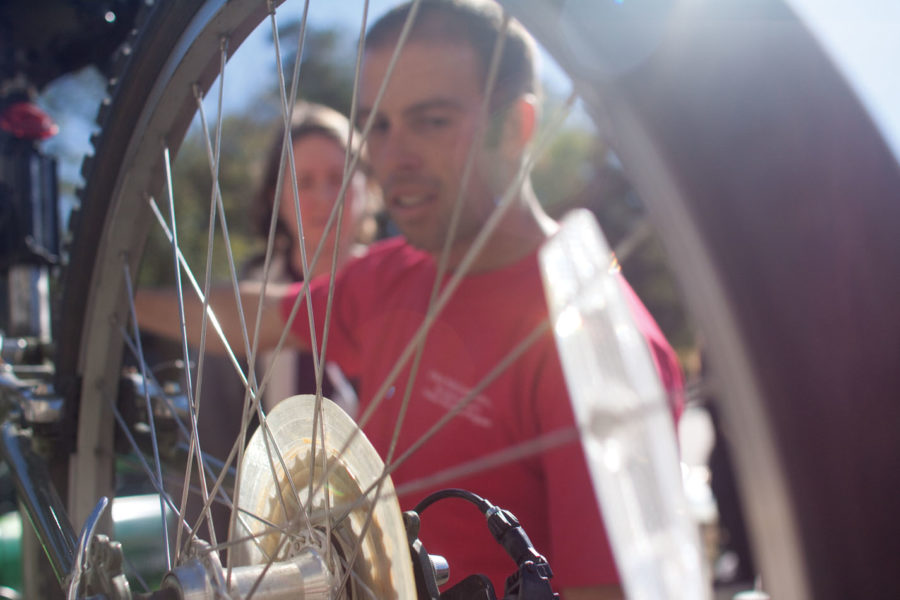Student organizations conglomerate toward sustainability
Photo: Kelsey Kremer/Iowa State Daily
Outdoor Recreation services program assistant Chad Ward tunes up the bike Erin Kelly, senior in chemical engineering, rides to and from class each day during the sustainability fair on Wednesday, Oct. 20, in front of Park’s Library.
October 21, 2010
A variety of student organizations gathered together Wednesday at the free speech zone for National Campus Sustainability Day.
Engineers who participated in the event have been working on various projects including a solar water heater.
“The main goal is to be able to use it as a water heater on campus and during the winter, heat it up and make hot chocolate,” said Owen Mayer, sophomore in mechanical engineering.
Other projects include an electrical motorcycle that participants want to create a rechargeable, wind-powered turbine for that will help charge the bike overtime.
The group plans to experiment with the idea of door power.
“We’re experimenting with the energy it takes to open a door if we can hook a generator up to it at all. Every time a door gets opened, it gets a little resistance and hopefully creates enough charge to power something,” Mayer said.
Engineers for a Sustainable World strives to incorporate sustainability both internationally and on campus. From an international approach, the groups has incorporated solar streetlights, solar food drying and using bio-gas digesters in Uganda that use manure fumes to produce electricity.
ESW is planning to implement more harvesting programs for irrigation purposes in Nicaragua. A team of graduate students plan to work on the project this spring.
From a local perspective, the organization has used energy audits in both the library and black engineering building.
“We basically see how much energy they are using, what easy ways can we reduce that and by how much, and how much money we can save,” said Pasha Beresnev, vice president of ESW.
ESW’s goal is to do this for the entire college of engineering, Beresnev said.
Members also plan to assimilate solar street lights on campus, replacing lights where there is no need for the large electrical lights.
Along with the engineers, ActivUs was present, recruiting more people for its coal campaign.
GreenHouse Group was there to promote its upcoming events including Raktober, located north of the knoll, which will be held at 2 p.m. Sunday, and Earth Day in March.
Slow Food ISU and ISU Dining both suggest ways for students to dine sustainability.
Slow Food ISU is a new student organization which encourages students to cook more and eat organic foods. The group plans to have pot lucks for cooking demonstrations along with car pooling to local markets for students to have access to more organic foods.
ISU Dining has a program, Farm to ISU, which supports serving local produce.
“[Local produce] helps because you’re helping the local economy and you don’t have everything being shipped from across the ocean,” said Anna Vance, sophomore in culinary and human sciences.
ISU Dining Sustainability has a compost program which uses both pre-consumer and post-consumer waste.
“Anything extra that we have from prep that we normally throw away, we’re composting all that food,” Vance said.
ISU Dining is trying to consolidate two other programs, to both cease the production of extra, unnecessary food and a “heat up time equal to prep time” program where dining halls will only heat up their food early enough to serve the food ready for students instead of heating the food all day.
The Sustainable Agriculture Student Organization offered a place of dialogue amongst students about sustainable agriculture, said Drake Larsen, graduate in natural resource ecology and management.
“We offer to the public our sustainable agriculture colloquium every Wednesday,” Larsen said, “we have various speakers come in and talk about sustainable agriculture.”
SASA also promoted the water and land legacy, which, if enough voters approve, it would set up a sustainable and secure trust fund for natural resources issue and promoting clean water, family farms and quality of life, Larsen said.
ISU Outdoor Recreation gave students free bike tune-ups to “promote the idea of bicycling as a mode of transportation,” said Chad Ward, program assistant in recreation services.
Faculty organizations had also attended, trying to promote sustainable awareness on campus.
The LAS Green Team, which began last year, consists of faculty, staff and students who focus on improving the college’s outlook on sustainability, said Bill Simpkins, professor of geological and atmospheric sciences.
“People got plagues for decreasing the amount over the previous three year average,” Simpkins said.
The Green Team will plan a speaker series for sustainability issues on campus. Members want to initiate a student green team this year to encourage more student involvement.
“We’re trying to have the students push their agenda forward through the group,” Simpkins said.
With a variety of engineers, activists, students and faculty, the event had informed interested students what Iowa State is contributing for a sustainable university.







